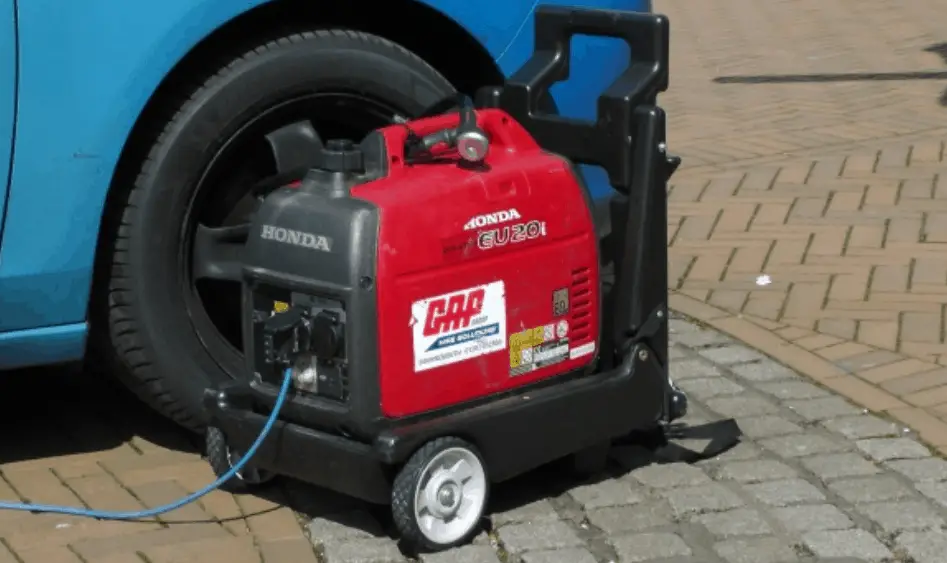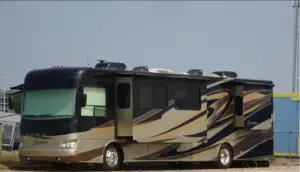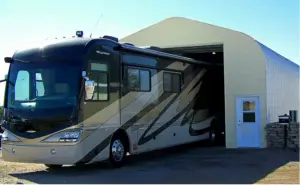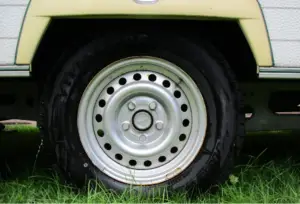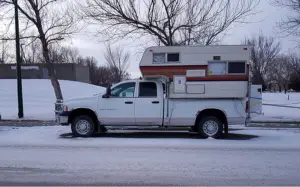Living in an RV wouldn’t be great if there aren’t your favorite appliances.
Imagine living in an RV without a TV, kitchen appliance like microwave, fridge or without an AC.
When you have electric shore power hookup it is possible to run all the appliances without any limitations. But, when the shore power isn’t available you need to use the available power carefully.
What Size generator for RV
Generator is your major power source in the absence of electrical hookup.
Getting a right generator size is therefore important if you want to run the appliances without any watts shortage.
How big generator you need in your RV is mostly dependent on bigger appliances like air conditioner, refrigerator, microwave, grill and heater. Based on how many watts these appliances would consume when running in parallel, you would need those many watts for your generator.
Lets see in detail about how to calculate the watts required for running the RV appliances.
Some appliances like AC, refrigerator have difference in starting watts and running watts. This means, they need more watts when starting but would use less watts when they are running.
Considering you have standard basic appliances in your RV, the generator size you would need is significantly based on the size of your Air Conditioner.
This is because an AC consumes significantly and also runs for longer durations as opposed to other high watts appliances which only run for short durations.
Below table indicates the minimum watts generator you should get for different AC sizes assuming you would also use other standard appliances like refrigerator, lights, fan, TV, laptop and microwave.
| Air Conditioner BTU | Minimum Generator Watts |
|---|---|
| 5000 BTU | 1800 Watts |
| 7500 BTU | 2200 Watts |
| 10,000 BTU | 2800 Watts |
| 13,500 BTU | 3500 Watts |
| 15,000 BTU | 4000 Watts |
Above minimum generator watts are considering you would run other appliances like refrigerator or lights in parallel as well. A refrigerator would consume around 150 Watts while running.
Watts consumed by different appliances in RV is listed in below section. In next section below, i have also explained watts you would need with an example (considering you have specific appliances). Read on.
Calculating Watts for RV
Appliances in RV need power and while boondocking, without shoreline power, your better source is generator.
Different appliances have different power considerations. While some of them can run on DC, others need AC power supply. While camping without electricity hookup, planning is key. You need to utilize the generator power with caution and avoid unnecessary usage.
Here is the average watts consumption by common RV appliances.
| Appliance | Starting Watts | Running Watts |
|---|---|---|
| Air Conditioner 15,000 BTU | 3500 W | 1500 W |
| Air Conditioner 13,500 BTU | 2600 W | 1300 W |
| Air Conditioner 10,000 BTU | 2000 W | 700 W |
| Refrigerator | 600 W | 200 W |
| Microwave | 900 W | 900 W |
| Television | 150 W | 150 W |
| Coffee Maker | 550 W | 550 W |
| Grill | 1500 W | 1500 W |
| LED Lights | 8 W | 8 W |
| Laptop | 200 W | 200 W |
| Heater | 1200 W | 1200 W |
| Hair Dryer | 1900 W | 1800 W |
Calculate the maximum watts your RV appliances can consume together and select a generator rated at watts slightly above that maximum value. You need that margin to make sure you wont overload the generator and cause it to shut down or damage your appliances.
I know the watts calculation can be confusing. Lets calculate using an example.
Example of watts calculation
Lets say you have a generator of size 3500 Watts.
When a generator is rated at 3500 watts its the max that can be used for starting the appliances. For long term running use, you could only use up to around 2500 watts. So, when a generator is rated at a value, it is for starting but for running, it is generally 10-15% lower.
Lets see what you can run with this generator.
Consider you have below appliances and want to run each of these.
| Air Conditioner | 13,500 BTU |
| Refrigerator | 100 Watts for running |
| Television | 150 Watts |
| LED Lights | 8*5 = 40 W |
| Microwave | 900 Watts |
| Laptop | 200 Watts |
When you start the AC, it will need approximately 2600 watts. With this, you could still use 900 watts for other purposes.
But, as the AC starts running, it will consume lesser watts to around 1300 watts. This, now means, you can use around 1200 watts for other purposes
Starting a refrigerator will take around 600 watts. Once it starts running, the watts it will use is around 50 W.
With both AC and refrigerator running, you are now left with 1200 watts.
You can still start a 900 watts microwave and also run lights, laptop, television.
To conclude on this, a 3500 watts rated generator is good enough to run a 13,500 watts AC along with other standard items like refrigerator, microwave, TV and lights.
Let me give you more examples. This will hep you in deciding how many watts you really need.
Common question that many people have is can a 2000 watts generator can run an Air conditioner?
Lets look at various watt sizes and what they can run in your RV.
| Generator Size | What can you run? |
|---|---|
| 2000 Watts | Can start and run up to 10,000 BTU AC provided no other major appliances are already running. |
| 2500 Watts | Good enough for up to 10,000 BTU AC along with other standard appliances like Refrigerator, lights, laptop, etc. |
| 3000 Watts | Can start and run up to 13,500 BTU AC along with other minor appliances like refrigerator and lights. |
| 3500 Watts | Can start and run up to 15,000 BTU AC if no other major appliances are running. Good enough for 13,500 BTU AC with other standard appliances. |
| 4000 Watts | Good enough to run up to 15,000 BTU AC along with other appliances like refrigerator, microwave, heater and lights. |
What about running 2 AC’s?
To know this, just add the watts required by each AC and apply the same rules that we discussed. For example, if you want to run two 5000 BTU AC’s, you would at least need 2200 watts generator.
What will happen if you overload the generator?
If the watts needed by your appliances exceeds the watts that the generator can supply, it will overload the generator. This can result in either intermittent power supply which can damage the appliances or it will shut off due to circuit breaker.
Most modern generators have circuit breakers which help in protecting your appliances when it is overloaded.
Consider Each Appliance’s Consumption
Having seen how each of the different appliances can consume on an average, you may still have to consider based on your personal usage.
Each one us are different and use our appliances in different ways which is also based on where we live, what season it is and also on how big our RV is.
Lets see in more depth about each RV appliance.
Air Conditioner
AC in your RV is without any doubt, the one that would need more watts than anything else.
When getting a generator for your travel trailer or a motorhome like class C RV, this is one of the critical point. Will the generator be enough to run the air conditioner or not. AC is by far the appliance that consumes most watts.
Its just not about how much it consumes while running. You need to know about the starting watts as well. Reason? the starting watts are higher than what it needs to keep running.
An AC is different from a refrigerator in RV. A refrigerator would not consume much while in running state but the air conditioner consumes a lot. An air conditioner can be of different sizes, its measured in BTU (British thermal unit)
A big motorhome can have BTU as high as 15,000. Depending on how much BTU is the AC, it will need starting and running watts accordingly. A 5000 BTU will need at-least 1000 watts for starting and 400 watts while running.
Similarly, a 7500 BTU means a 1600 watts for starting and around 600 watts for running. A 13,500 watts BTU and the starting watts of around 2600, running watts around 1300.
A 15,000 BTU AC would need around 3500 Watts for starting and it would be little lower for steady running to around 1800 Watts.
So, if you have a 2000 watts generator it may be sufficient to run a air conditioner of BTU upto 5000. But with other appliances you really need to plan.
You need to look at the starting watts as you cannot have lesser watts on generator than that. And you are not only going to have AC running but other appliances as well. Thus, combine all your requirements and then decide on the generator.
Refrigerator
Refrigerator is another main appliance whose wattage would play important role in determining the wattage for the generator. A typical RV refrigerator would take up around 600 Watts for starting and consume around 200 Watts for proper running. Remember a home type refrigerator can take up more than the usual watts for operation and a larger fridge and freezer combo will take up more than 1000 Watts.
Television :A small TV would mean you will have to spend around 150 Watts.
Microwave : It will consume around 900 to 1000 watts.
Laptop : A laptop or computer will need close to around 200 watts. No matter how small, its important to consider all such requirements.
cooker : Will consume around 200-300 watts
Heater : Running watts of around 1200-1300 watts
Lights in RV : This depends on the watts if you have 60 watts bulbs or lesser. Having LED lights can save a lot on watts consumption
Coffee maker : It will need around 500 watts. Having a coffee while boondocking is great but do keep a check on this.
Grill : An electric grill would need you to spend almost 1500 to 1800 watts. So, be cautious while using it. If you are planning to add the grill, then just keep note of its watts consumption. Or try and get a one that consumes lesser.
Smaller fan : This will consume depending on the size. Will be mostly around 50-80 watts.
Taking all this items you should have a fair idea of whats your consumption and then decide on the generator size. You will have to read the manual or sticker on the appliance of all appliances to find out their exact running and starting watt requirements.
With a moderate usage of above appliances you should be good to go with 3500 watts and for heavy usage you will have to go higher to 4500 Watts and higher. For light usage you can consider having two 2000 Watts generators connected in parallel and opt out the second one when you don’t need it.
You also have to keep in mind about portability before finalizing the deal.
Another important thing to keep in mind is buying a new generator would give you warranty and you may not want to miss on that.
It is not bad to save money when you don’t need those extra watts but could be foolish if your needs were high and you bought generator that is just not enough for your needs, specially if you are camping out with your family.
Considerations While choosing a Generator
It is very important for you to consider your detailed needs, your appliances before you finalize that wattage. Generators work everywhere at all altitudes, provide proper access for maintenance and are also portable. You need to make sure the wattage of your generator is good enough to start all of your appliances and keep them running.
In case you are wondering what generator you should buy for RV then here is a list of 10 best RV generators that you can buy for your RV.
Major Appliances and watts
Air Conditioner, Refrigerator are the ones that use most of the power in your RV. So, you need to pay close attention to the power requirements of them. You also need to be thoughtful on you own habits when these two come into picture.
You would need more wattage if you think you are heavy user or else you can go easy on generator wattage. But, it also depends on the type of your AC and fridge and their working, model and age.
A better way to decide on the generator wattage would be to list down all your appliances and check how much wattage they would need. Note that an AC or fridge would normally take more to start and little less to running so you need to take this criteria seriously into calculation.
Once you note down all appliances check on the stickers on them to see their running and starting powers and sum up all to check how it comes down to. Once you have the total, the best thing would be to select the wattage that is not cut to cut to the total but to go for little or more higher than that total.
Weight
It is important to understand that a larger wattage generator would also be heavier and larger. That will take up the space and also mean you will have to be physically fit to handle the weight. Most generators come up with wheel kit thus you can be little relaxed on this front but it may not be that easy either.
A lighter generator would always be preferable as it becomes easy to get it in and out. You can also connect 2 generators in parallel to get higher power like for example two 2000 watt generators connected in parallel would provide 3600 Watts than a single larger watt generator is always preferable as it would take less space and much easier to handle.
Amps
RV generator can be 30 amp or 50 amp. Your motorhome or travel trailer also can have either 30 amp service or 50 amp service. Depending on this adapters can be used if there is mismatch.
Once you are on generator remember that you may not be able to run everything at a time if the appliance needed wattage exceeds your generator wattage. Thus, a rule of thumb here would be to start things that are needed most and then go on.
An AC is generally the one that needs most wattage, then the fridge so you need to be careful with this. Running everything in parallel in an generator operated RV is something that everyone would want but a limited wattage on generator would mean you will have to plan as per preference.
A correct generator size would always be dependent on the running and starting wattage of your most appliances. Other factors like weight, portability, etc would also come into picture but the base should be the wattage of your mostly used appliances.
Portability
Consider the portability of the generator before you finalize on the generator size as this will be important thing. Higher the watts, higher will be the size. There are lots of portable generator manufacturing companies like Honda, WEN, champion, Yamaha that produce lite weight and portable ones.
Noise
Generators do power up your loved appliances but they come with a pitfall. They make noise, not all, but most of them do. Its either could potentially annoy you or anybody around camping just like you. Would you be bothered about that noise on a nice chilling evening, if yes then pay a little more attention while buying it.
A larger wattage generator tend to make more noise but a branded one may not make that much noise but then again you may have to shell out more on it. A noise more than 70 db would be bad for a generator.
It is completely up to you on whats your budget and what you want from it. A larger generator would mean more noise depending on the brand. Have a match depending on your budget, wattage and your ability to cope with noise nuisance.
Efficiency
A better running and high efficiency is all you need in a RV generator
Weight
With RV being a vehicle that packs in so many items weight definitely on everyone’s mind. Getting a light weight generator is as critical as its run time or efficiency. Whether you have a tent trailer or pop up camper or a big class A or Class B RV weight does not matter.
Fuel
What type of fuel it uses. Ideally, It should be same as what the RV runs on. Fuel capacity is also important. You want larger run time and for that, two aspects are important. One, the efficiency and the other is the fuel capacity of the generator.
Price
While weight, noise and efficiency are critical, price is obviously an important factor too.
Extra features
You can get lots of other features like fuel level bar, remote start stop. Having such features makes life easier for you.
Generator fuel source
Generator for Rv can be powered by any of the below fuels
- Diesel
- Gasoline
- Propane
Each of these have their pros and cons. But, a fair rule is to get one of the source that is used the by Rv as well. Like if the Rv runs on diesel then go for a diesel powered generator. And if the RV runs on gasoline then go for gasoline.
Propane too can be powering the generators. You can buy various generators that run on propane. Propane can be stored inside RV and can power the generator.
Some of the most common generator specially for Rv are by cummin onan, generac. You would find generators that are quiet and efficient from these manufacturers.
Built-in or portable
You also have an option to go for Built in generator.
Advantages of built in Generator :
- It is very convenient to use. You just have to push a button to turn it On and Off.
- It would normally have the higher wattage and may be sufficient for your usage.
Disadvantages:
- It could be little difficult for servicing.
- It is designated only for RV and you cannot use it for any other purpose.
A Portable generator has below advantages :
- It can also be used for other purposes unlike built in generator.
- Servicing is easy in case of portable generators.
Portable generator’s disadvantages :
- You will have to find storage for it and it can be mounted on the RV itself.
- Extension wiring needed which would mean some wattage reduction at the actual end.
Below are the top 5 generators you can buy for your RV. You can choose based on your watts requirements. These are the tried and tested top brands out there, you only have to decide on watts.
- 98 lbs weight
- Operates at 58 decibels
- Clean Power

- very less weight at 48 lbs
- 51-61 decibels noise

3. Honda EU2200
- Very efficient
- can run 13,500 BTU AC
- Heavier

- 53 db noise level operation
- Weighs 48.5 lbs
- Produces clean power and prevents damages to sensitive electronics.

- Weighs only 48 lbs
- Quite operation at 52 dbA

Conclusion
Getting a right sized generator is critical if you boondock often in RV. Depending on the number of appliances you use, the generator size will depend. One of the appliance that decides how much watts you need on a generator is the air conditioner. Bigger the RV, larger is the BTU and higher watts you need on generator. Its not only ac but also other concurrent appliances you run and thus take all other items into consideration as well.

